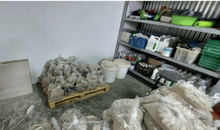
 Flash News
Flash News
Posta e mëngjesit/ Me 2 rreshta: Çfarë pati rëndësi dje në Shqipëri
Ceno Klosi with over 800 stolen votes, Balluku finds the reason is the tiredness of the counters
"Fast & Furious" in the former Block, police chase an Audi Q8, 4 cars collide
Car hits two tourists on a motorcycle in Fushe Arrëz, one of them dies
Serious accident in Thumanë, one dead, 3 injured

Alfred Lela
Koloreto Cukali, during those boring meetings in any hotel in Tirana where books are promoted, seminars are held, or bombastic conferences are held with big solutions for Albania, he could hand out some business cards. As a filmmaker, NGO man, radio show host, columnist, etc. Not that anyone has come out yet with a business card that reads Poet, but I think that Cukali would not be presented anywhere, anywhere, as such.
The inauguration of the book at QKLL (National Book and Reading Center) was so discreet, almost like a Masonic session. In a quite strange and perhaps poetic way, it is located on the back of a shepherd.
This urban mise-en-scène made the inauguration of Cukal's book seem like an illegal, revolutionary act. The author also shares this impression, saying that the poem should be distributed as a tract.
This does not mean that Koloreto Cukali is shy of his status as a poet. Still, without saying it, he is disturbed by the disregard in the public sphere of one of the oldest and noblest genres of civilizations: poetry.
The emergence of this concern is perhaps the very reason that prompts him to write. In a code, language, or genre that seems almost forgotten. Perhaps this is his way of rebelling, trying to keep alive, against the current, the light industry of the verse, in spite of the increasingly heavy industry of the image, of its shrill and endless repetition.
At the same time, poetry can also be how Koloreto Cukali confesses about those 'sins' he commits against poetry, participation, for one reason or another, in pop culture, in mass communication.
More or less, as he says in one of the lines, The windows of the buses have turned into TV screens,/ where those who have been denied/ the time they deserve on the national screens appear.
In this sense, Cukali's poetry is committed, not in the sense that the leftists of the mid-20th century gave to commitment, but quite differently, a spiritual commitment. Not to define social classes and orders, but the spiritual and where it takes humanity (or spiritually).
This grimace seems to be the verse. The year '92 seems far away;/we bathed less often, /but wore less smell, /we could see each other in the eyes and on the street.
The intimacies that unfold in Cukali's poems are transformed into sociality because poetry, for him, is an act against the system. It is also a system of acts that configure a spiritual and social state and, thus, together, that space that we know as a community.
This community, in Cukali's verses, faces an exorcism that is as much of the author as of his poetic subjects. This is how our girlfriends smell of smoke/ like coming from pubs/ or from wood stoves. Their young noses lead them helplessly to the slaughterhouse.
When he talks about 'slaughterhouses,' the author has in mind the aesthetic clinics of Tirana, but especially the oppressive showcases into which social networks, screens, and the whole wanna-be industry that flourishes in Albania have turned.
This atmosphere, this oppression, which is also found in a Hatibian verse by Cukal, unfolds like this: We are oppressed by the palaces/ that drive the streets like drunken cars.
Koloreto Cukali, instead of a business card, can easily distribute his book and say without shame: I am a poet. The fact that he is silent, as a poet, not as an engaged man of the public sphere is related to the fact that, as a craftsman, he lives for the spiritual, as a professional he has to live.
In verses like these: There are many dying things,/ natural green,/ dumplings,/ and men named Gege. But not you./ You breathe asbestos/ and squeeze into buses/ protecting the cell phone; a man is revealed who rediscovers the past, the old, the traditional, not only as a time dimension but more as a contradiction, as a contrast, as a survival, yes you wanted. In this sense, Cukali is conservative, and rightly so. Any repetition presented as new is sure to get up his nose.
In the finale, Koloreto Cukali's poetry can be said to be a subversive act, not to bring something new (this is an illusion—there has been nothing new since the Tower of Babel) but to keep it known.
This makes him a genuine poet, and his book Marshi funebr i gëlave de detit is a sure business card for future anthologies of Albanian poetry.
Latest news

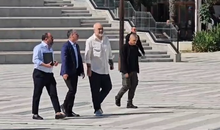


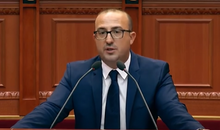
Korreshi: Election manipulation began long before the voting date
2025-07-03 09:39:13
Arrest of Greek customs officer 'paralyzes' vehicle traffic at Qafë Botë
2025-07-03 09:28:41
After Tirana and Fier, the boxes are opened in Durrës today
2025-07-03 09:21:10
Enea Mihaj transfers to the USA, will play as an opponent of Messi and Uzun
2025-07-03 09:10:04

Foreign exchange, the rate at which foreign currencies are sold and bought
2025-07-03 08:53:50
Index, Albania has the worst quality of life in Europe
2025-07-03 08:48:10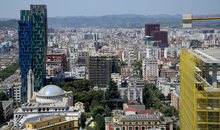

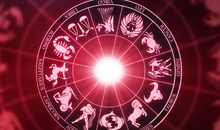
Horoscope, what do the stars have in store for you today?
2025-07-03 08:17:05
Clear weather and high temperatures, here's the forecast for this Thursday
2025-07-03 08:00:37
Posta e mëngjesit/ Me 2 rreshta: Çfarë pati rëndësi dje në Shqipëri
2025-07-03 07:46:48




Lufta në Gaza/ Pse Netanyahu do vetëm një armëpushim 60-ditor, jo të përhershëm?
2025-07-02 21:56:08
US suspends some military aid to Ukraine
2025-07-02 21:40:55



Methadone shortage, users return to heroin: We steal to buy it
2025-07-02 20:57:35
Government enters oil market, Rama: New price for consumers
2025-07-02 20:43:30
WHO calls for 50% price hike for tobacco, alcohol and sugary drinks
2025-07-02 20:41:53







Israel agrees to 60-day ceasefire in Gaza, but many unanswered questions remain
2025-07-02 18:35:27
The weather in Germany is going "crazy", temperatures reach 40°C
2025-07-02 18:22:21

"Fast & Furious" in the former Block, police chase an Audi Q8, 4 cars collide
2025-07-02 17:59:25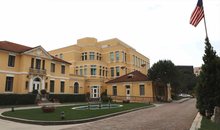
"Birth on a tourist visa? US Embassy warns Albanians: This is prohibited!"
2025-07-02 17:48:16


BIRN: Fier recount reveals vote trafficking within open political party lists
2025-07-02 16:57:19

CEO and former director of 'Bankers Petroleum' arrested in Fier
2025-07-02 16:40:42
Car hits two tourists on a motorcycle in Fushe Arrëz, one of them dies
2025-07-02 16:33:23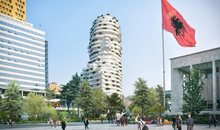


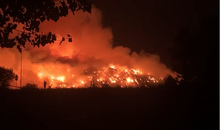
Fire at the Elbasan Incinerator Landfill, Prosecution Launches Investigations
2025-07-02 15:34:54
What you need to know if you travel to a country with active volcanoes
2025-07-02 15:33:03



EU proposes 90% reduction in greenhouse gases by 2040
2025-07-02 14:50:23
Europe is burning from the heat / Italy and France are on maximum alert
2025-07-02 14:36:52

Moscow's contradictory statements: Is the friendship with Vučić breaking down?
2025-07-02 14:21:05
'I lost my battle': Sea warming is killing fishing in Albania
2025-07-02 14:08:35
Sekretet kimike që ndihmojnë në mbajtjen e mjaltit të freskët për kaq gjatë
2025-07-02 14:01:26

Denmark makes historic decision to make military service mandatory for women
2025-07-02 13:44:33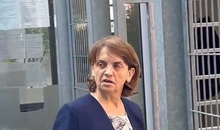
The appeal of the GJKKO leaves former judge Pajtime Fetahu in prison
2025-07-02 13:30:20
Productivity losses could reduce GDP by 1.3% as a result of extreme heat
2025-07-02 13:21:04
He abused his minor daughter, Zamir Meta is left in prison
2025-07-02 13:04:04

Waste burning in Elbasan, Alizoti: They are poisoning people and stealing money
2025-07-02 12:48:39
Civil disobedience continues in Serbia, dozens of people detained
2025-07-02 12:40:32
Rama's government was born under the sign of garbage and will end like this
2025-07-02 12:28:09
Water prices increase in the municipalities of the Elbasan region
2025-07-02 12:13:38
Civil disobedience continues in Serbia, what is happening in Belgrade?
2025-07-02 12:07:44
Serious accident in Thumanë, one dead, 3 injured
2025-07-02 11:54:42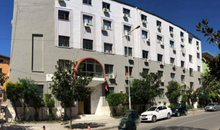
Durrës Court suspends the director of Pre-University Education from duty
2025-07-02 11:49:27
Plenary session on Thursday, what is expected to be discussed
2025-07-02 11:36:43
Europe is burning from heat waves/ What is the 'thermal dome' phenomenon?
2025-07-02 11:26:25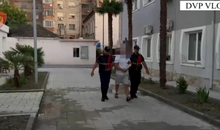
Wanted by Italy for murder, 45-year-old arrested in Vlora
2025-07-02 11:19:31
Fire situation, 28 fires reported in 24 hours, 2 still active
2025-07-02 11:13:20
"Buka" file, preliminary hearing for Ahmetaj postponed to July 17
2025-07-02 11:03:30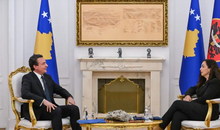


Baçi: Belinda Balluku and Ceno Klosi, the most dangerous "gangs" in Fier
2025-07-02 10:32:09
Zamir Meta, suspected of sexually abusing his daughter, arrives in court
2025-07-02 10:21:33

Trump: Israel has agreed to a 60-day ceasefire in Gaza
2025-07-02 10:01:55
Fire continues at Elbasan landfill
2025-07-02 09:51:13

Dates to note during July, important events will occur
2025-07-02 09:31:45
The hearing for Jorgo Goro's claim is postponed
2025-07-02 09:24:19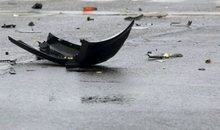

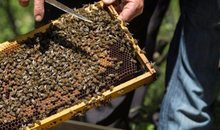

Foreign exchange, the rate at which foreign currencies are sold and bought
2025-07-02 08:42:31

52% of pensioners did not receive full pension in 2024
2025-07-02 08:27:18
Horoscope, what do the stars have in store for you today?
2025-07-02 08:13:36
Hot weather, Wednesday brings high temperatures
2025-07-02 07:59:16
Morning Post/ In 2 lines: What mattered yesterday in Albania
2025-07-02 07:46:15
Heatwave sweeps across Europe, Spain and England record hottest June ever
2025-07-01 22:57:41

